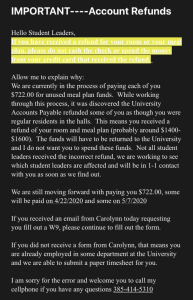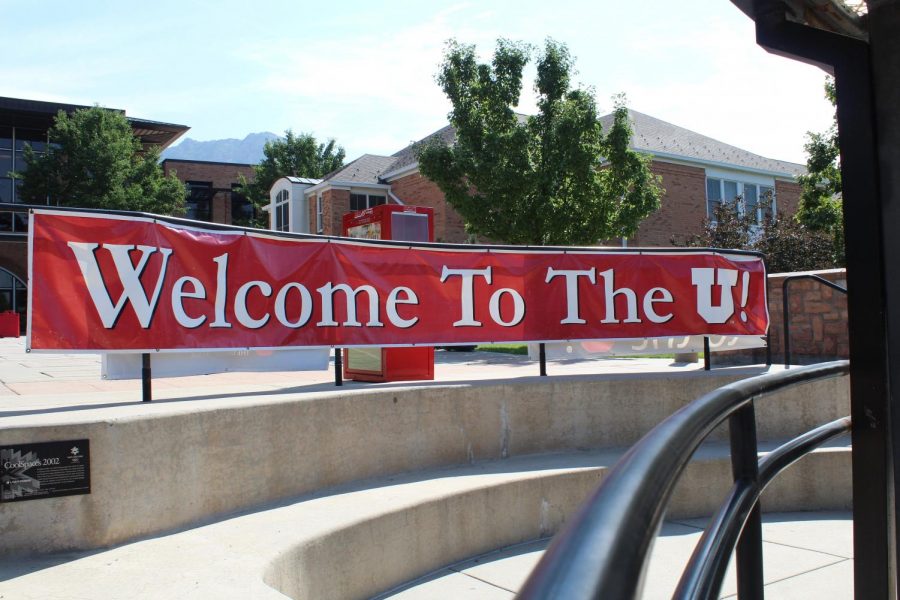
(Banner welcoming students living on campus to the University of Utah in Aug. 2014 | Chronicle archives)
Pandemic Pandemonium: Student Leaders at the U Lose Housing Contracts, Fight for Compensation, and then Lose It
April 18, 2020
The first email student leaders received from Housing and Residential Education told them they could keep their jobs and stay on campus amidst the pandemic. The next five, however, told a very different story.
It all started on March 8, 2020, when student leaders at the University of Utah received an email telling them they could remain on campus if they wished. They were required to fill out a survey explaining where they went over spring break, which would determine if they needed to self isolate for two weeks.
Then, an email was sent telling student leaders that HRE respected the decisions of the student leaders, whether they chose to stay on campus or not.
Three days later, the tone of the emails shifted. Student leaders were urged to go home if they had the means.
“It was first, ‘we encourage you to move off campus if you’re able to, if it is easy for you, but we are not forcing anyone to move off campus,'” said Lily Bosworth, a resident assistant in the Marriott Honors Community and fifth-year senior studying geological engineering and environmental geoscience.
“They said there wouldn’t be any repercussions if RAs chose to live off campus. I think at that point the messaging was pretty clear and fair, but one caveat with RAs was that at that point, if you chose to move off campus, it was your choice, so you weren’t going to receive any compensation.”
The next message required student leaders to fill out a form that would show HRE if they fit into one of three categories —international students, students who are homeless or students who were in the foster care system.
“At this point, most of the people I talked to interpreted that as ‘you have to go home, and no we’re not going to compensate you.'” Bosworth said some student leaders called members of housing administration. They confirmed that people who chose to go home would not receive compensation. “There was a lot of confusion there,” Bosworth said.
The confusion created by HRE communication was also present in the actual surveys they sent out to student leaders.
“They had you fill out this intent-to-stay survey, and then on the actual survey it listed one of the reasons as unaffirming household, which wasn’t listed in the email,” said Tammy Haddad, a social justice advocate at Shoreline Ridge and a senior studying elementary education. She asked her boss if the survey meant she had to leave. Haddad, who had not lived with her parents for more than four years, did not want to move back in with them. “I was planning on moving out in a month anyway, but it’s kind of hard to get an apartment when they give you a week’s notice to move out,” she said.
Haddad believed that it was important for HRE to know if a student did not have an affirming household to return to. However, she says the unaffirming household option on the form was not clearly communicated.
“My boss told me that I should try to appeal with the state, because there was nothing they could do, but she didn’t mention the unaffirming household, which I imagine is for LGBT youth,” Haddad said. “I was the RA in the Alliance House last year, so it made me worried for my former residents because I was wondering if they felt in the same situation as I did.”
Student leaders also received conflicting messages about how they would be compensated.
“After a lot of us started asking that question [compensation] and pushed it up the ladder. One RA did reach out to President [Ruth] Watkins about it. We felt like at that point we were being asked to leave, but we weren’t receiving compensation,” Bosworth said. “We felt like we were being laid off, but that wasn’t the language housing was using.”
After questions from student leaders started to reach upper administration in housing, a phone call between HRE and student leaders was arranged.
During the phone call, HRE told student leaders they could stay on campus if they wanted to. If leaders wanted to leave, they would be compensated for food. HRE offered $722 to student leaders to make up for lost meal plans. This compensation is only available to student leaders who canceled their contract starting March 23 through March 27.
“The compensation, I think, is really sufficient,” Bosworth said. “I did end up moving off campus. I have the privilege of getting to live at home with my mom. It was going to be a problem if I didn’t get compensated for food, so I’m really glad that they’re giving us that.”
Some feel, however, that the compensation HRE is offering is not sufficient.
“They offered us that $722 and I already started packing, so I was like, ‘I guess I’ll just take it,'” Haddad said. She was initially satisfied with the payment, but a conversation with her mom changed her mind. Her mom said, “What’s that going to do? That’s not even a security deposit on a new apartment. That’s not even a month of rent on a new apartment.”
These issues of communication led to some issues in finding housing. Because students felt like they did not fit in the categories listed in the survey, they canceled their contracts and had to find other living arrangements.
“I had to move in with the person that I’m dating, because it just happened to work out. I felt like we’ve been dating long enough, and they happened to have an extra bedroom and we just moved all my stuff in there. It was not like I had much of a choice, because I couldn’t have moved all of my stuff back to Vegas,” Haddad said.
On top of moving all of her things from her dorm to her new living arrangements, Haddad also had to handle online classes. “It really sucked to have to email all of my professors basically and be like, ‘I got kicked out of my housing, I’m trying to find a new place, I’m sorry I can’t attend my Zoom lectures this week.'” Haddad shares a single laptop with her mom and sister, which makes online school an extra challenge.
While miscommunication caused issues for some student leaders, others believe that HRE did all they could do, given the circumstances.
“There was a rocky patch in there, but in the end, it did get resolved, at least from my perspective. The rocky patch is really understandable, given that it was happening so quickly and a learning curve for everyone,” Bosworth said.

Questions of payment for student leaders may still not be entirely resolved. The latest email sent to student leaders from Todd Justensen, the director of HRE, instructed that the individual compensation that leaders received should not be deposited yet, as some students were erroneously compensated as regular students, with some receiving upwards of $1600.
In addition to issues of compensation for food from HRE, some students are wondering about how they will be compensated for parking permits.
Haddad checked the parking permit information online, and saw that they were not offering reimbursement for parking passes if they were used past April 1. Commuter Services claimed that after this point, drivers will have obtained enough value from the permit.
“I sent them an email saying I had to leave in March with all the other students, and I sent them my housing cancellation contract,” she said. “I don’t know how they can say that you already got the value. I think that if you buy a parking permit, it’s good for a year. I got mine in August … and now I will not be returning to campus because everything got moved online,” Haddad said.
Some student leaders were frustrated with the way HRE handled the situation, but others felt that housing did their best to handle an unstable situation with short notice.
“There were a couple of days where it was really frustrating, but in the end, I think housing made it so that everyone got the best available option to them. I think in the end, they did a really good job,” Bosworth said.
Editor’s note: Signs and symptoms of COVID-19 include fever, dry cough, tiredness and shortness of breath. These symptoms are believed to occur between two and 14 days after a person is exposed to the disease. If you have these symptoms and have recently come into contact with a person who is known to have COVID-19, or if you have recently traveled to an area with community spread of the disease, you should call your doctor. Areas with community spread of COVID-19 are believed to include China, South Korea, Italy, Iran and Seattle. If you do not have a doctor who you visit regularly, please call the Utah Coronavirus Information Line at 1-800-456-7707 or the University of Utah Health hotline at 801-587-0712. Do not go to a healthcare facility without first making arrangements to do so.



Lisa Hazel • Apr 20, 2020 at 10:15 pm
For all the things President Ruth Watkins has off her plate, she especially did not do a good job advocating for students in need. Here is another example of our President of the University of Utah not putting students first. It is absolutely incredible to read and see how rare it is for students to be put first by the President. She showed her true priorities when Lauren McCluskey was shot seven times and an official apology wasn’t ever given to Lauren McCluskey’s parents. Now we see it when young students are easily taken advantage of by more experienced institutions. When will our President truely give every effort to protect the most vulnerable on campus? I’m still waiting. So far I have been sorely disappointed.